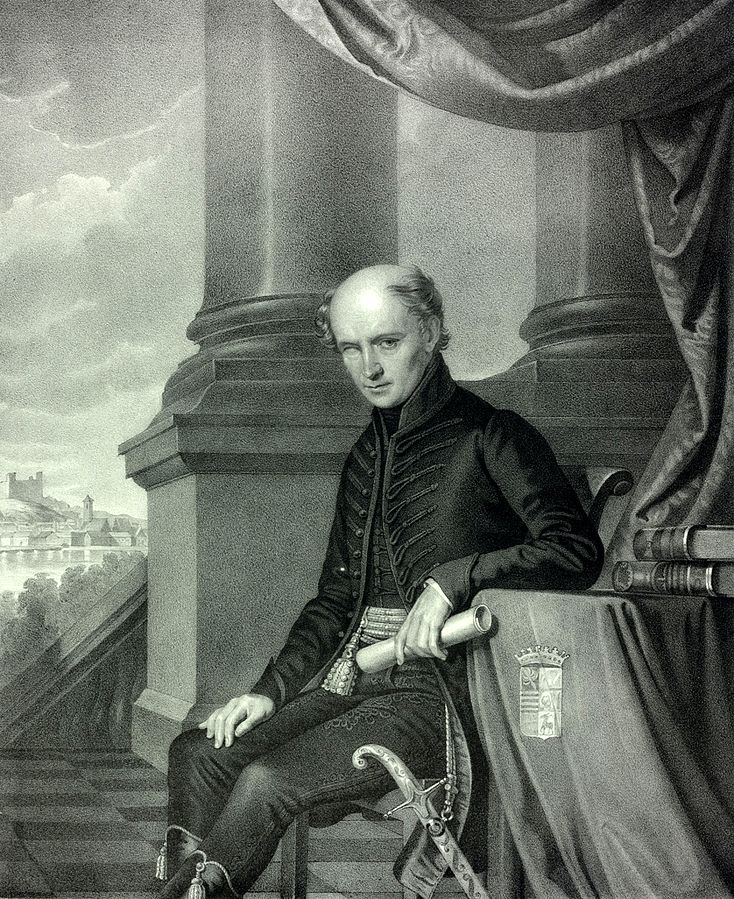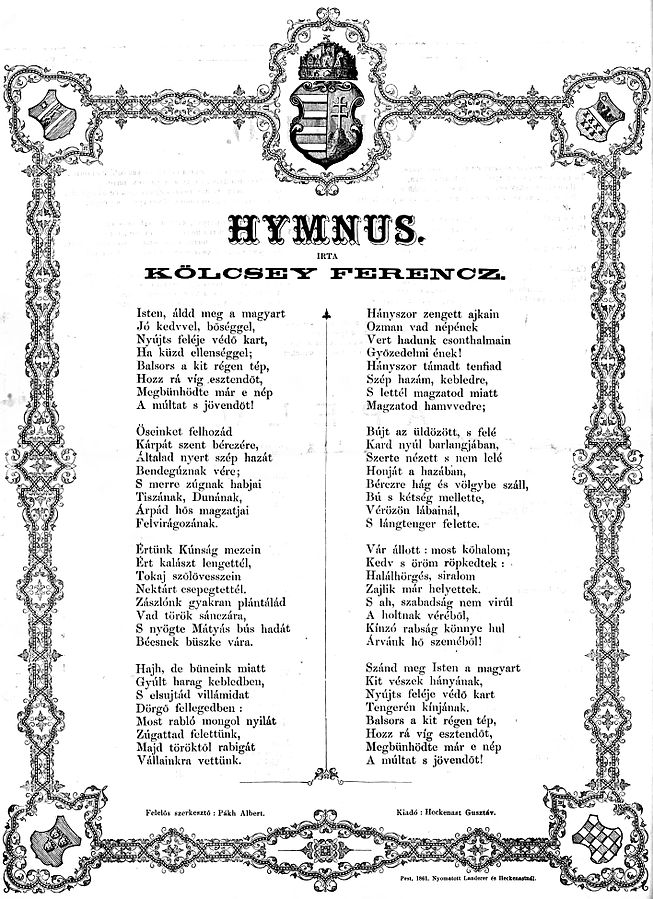Change language:
Ferenc Kölcsey, the author of the Hungarian national anthem, was born 230 years ago

On August 8, we celebrate the 230th anniversary of the birth of Ferenc Kölcsey, a Hungarian poet, literary critic, politician, and founding member of the Kisfaludy Literary Society. Kölcsey was the most outstanding poet to emerge within Kazinczy’s circle, and he is chiefly remembered today as the author of the Hungarian national anthem (‘Hymn’, 1823). In his oeuvre, the romantic elements mingle with classicist and sentimental features.
Early life
Kölcsey was born in 1790 in Sződemeter. He lost his parents at an early age and was handicapped by losing one eye to smallpox. These factors most likely contribute to the fact that he spent his school years in Debrecen in solitude and was known as a retiring youth with an intense, almost pathological love of books, Rubicon wrote. His imagination was occupied by the classics, particularly the deeds of Greek and Roman heroes. Later, Kölcsey turned his attention towards modern French writers: Bayle, Montesquieu, Regnard, Rousseau, and Voltaire, and German poets Bürger, Gessner, Goethe, Herder, Klopstock, Lessing, and Schiller.

Photo: Wikimedia Commons by Franz Eybl
Studies and poetry
In 1805, the young Kölcsey met Ferenc Kazinczy, the most prominent agent of the Hungarian language reform, at the funeral of Mihály Csokonai Vitéz. As a mentor and friend, Kazinczy helped the poet to develop his skills and talent. At the age of twenty, Kölcsey went to Pest for law school. During these years, he got acquainted with Pál Szemere, István Horvát, and Mihály Vitkovics. Kölcsey soon moved to Álmosd and then to Szatmárcseke where he lived in complete isolation with only books for company. He devoted his time to aesthetical study, poetry, criticism, and the defence of Kazinczy’s theories.
Kölcsey was fond of expressing abstract notions of beauty, ornamented by colourful adjectives, and he consciously experimented with structure.
The tone of his early poems is sentimental and self-torturing. In 1817, he wrote his first patriotic ode (“Rákóczi, hajh”), in which he reproaches public opinion for its apparent lack of respect for the historical past. “In the early 1820s, his poetry became increasingly concerned with patriotic themes because of his own disposition and his growing involvement in contemporary politics, which eventually led him to prominence in public life.
The most representative piece of his poetry, epitomising his views on Hungarian history, was the “Hymnus” (“Hymn”, January 22, 1823), evoking the glory of the early centuries – the Conquest and the reign of King Matthias – while presenting a morbid catalogue of national tragedies from the Tartar invasion and the Turkish occupation to anti-Habsburg rebellions which had been violently suppressed,”
wrote Lóránt Czigány in A History of Hungarian Literature.

Hymn, translated by Lőw Vilmos (Loew, William N.)
O, my God, the Magyar bless
With Thy plenty and good cheer!
With Thine aid his just cause press,
Where his foes to fight appear.
Fate, who for so long did’st frown,
Bring him happy times and ways;
Atoning sorrow hath weighed down
Sins of past and future days.
By Thy help our fathers gained
Kárpáth’s proud and sacred height;
Here by Thee a home obtained,
The heirs of Bendegúz, the knight.
Where’er Danube’s waters flow
And the streams of Tisza swell,
Árpád’s children, Thou dost know,
Flourished there and prospered well.
For us let the golden grain
Grow upon the fields of Kún,
And let Nectar’s silver rain
Ripen grapes of Tokay soon.
Thou our flags hast planted o’er
Forts where once wild Turks held sway;
Proud Vienna suffered sore
From King Matyas’ dark array.
But, alas! for our misdeed,
Anger rose within Thy breast,
And Thy lightnings Thou did’st speed
From Thy thundering sky with zest.
Now the Mongol arrow flew
Over our devoted heads;
Or the Turkish yoke we knew,
Which a free-born nation dreads.
O, how often has the voice
Sounded of wild Osman’s hordes,
When in songs they did rejoice
O’er our heroes’ captured swords!
Yea, how often rose Thy sons,
My fair land, upon Thy sod,
And Thou gavest to these sons
Tombs within the breast they trod!
Though in caves pursued he lie,
Yet he ever fears attacks.
Casting on the land his eye,
He finds that e’en a home he lacks.
Mountain, vale — go where he would,
Grief and sorrow all the same —
Underneath a sea of blood,
While above a sea of flame.
’Neath the fort, a ruin now,
Joy and pleasure erst were found,
Only groans and sighs, I trow,
In its limits now abound.
But no freedom’s flowers return
From’ the spilt blood of the dead,
And the tears of slavery burn,
Which the eyes of orphans shed.
Pity, God, the Magyar, then,
Long by waves of danger tossed;
Help him by Thy strong hand when
He on grief’s sea may be lost.
Fate, who for so long did’st frown.
Bring him happy times and ways:
Atoning sorrow has weighed down
All the sins of all his days.
The title already reveals the genre and the rhetorical structure of the poem. The poet conveys the deeply religious character, guilt, and biblical antiquity of the language by assuming the position of a preacher-writer. The catalogue of the major events of Hungarian history is followed by a plead with God for mercy, claiming that the nation has already atoned for the sins of both past and future through the severe punishments it received in past centuries. Kölcsey’s “Hymnus” can be considered one of the most notable literary works of the Hungarian Reform Era (1825−1848); however, it was only included on the list of Hungarian national symbols in 1989.
Considering Kölcsey’s poetry, “A szabadsághoz” (“Ode to Freedom”), “Huszt”, and “Zrínyi dala” (“The Song of Zrínyi”) can be highlighted as his most prominent works; nonetheless, poems do not constitute a significant part of his oeuvre.
Literary criticism
In 1826, Kölcsey returned to Pest and established the Élet és Literatura (Life and Literature) literary journal with the help of Pál Szemere and the main members of the Aurora circle: Károly Kisfaludy, József Bajza, Ferenc Toldy, and Mihály Vörösmarty. This collaboration provided an outlet for Kölcsey’s critical insight, and
with his critical essays, he laid the foundation of theoretically grounded, serious criticism in Hungary.
His critical views were greatly influenced by Goethe, Schiller, Voltaire, and the French and German Enlightenment.
Involvement in politics and death
In the late 1820s, Kölcsey became more and more involved in public affairs. First, he joined the civil service of his county and served as a member of the Diet from 1832 to 1835. He was a firm supporter of political reforms, fighting for the modern transformation of the constitution and for the rights of the Hungarian language. His death came rather suddenly. He got sick during an official trip and died on August 23, 1838, in Szatmárcseke.
Source: Daily News Hungary







